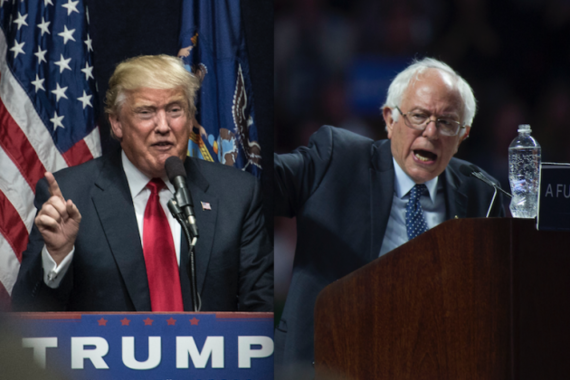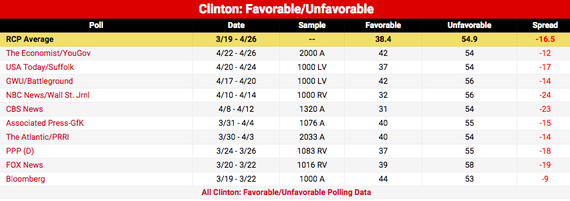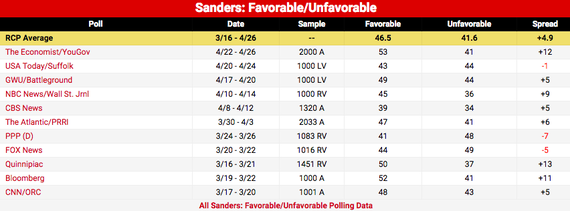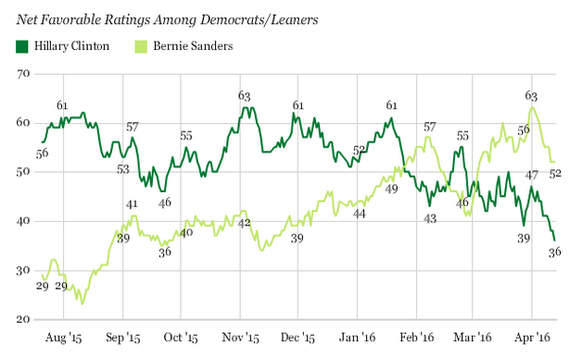1. Electability
All recent data confirms that Sanders beats Trump by a larger margin than Clinton. Some will argue that this is because Sanders has not yet been vetted by Republicans, as Clinton has been for years. This may hold some truth but does not adequately explain what polls have shown for months now. The reality is, Sanders matches up far better against Trump because of his record. People like Sanders and Trump because they opposed the war in Iraq. People like them because they opposed trade deals that sent American jobs overseas. People like them because they don't take big money from super PACs, Wall Street or the fossil fuel and pharmaceutical industries. On the flipside, people dislike Clinton because she voted to authorize the trillion-dollar war in Iraq, supported disastrous trade deals that cost millions of Americans their jobs and continues to take big money from special interests.
But don't take my word for it. Take a look at these general election polls. In most of them, Clinton defeats Trump, but in one poll, Trump actually beats Clinton.
Clinton: +6.4, +6, +13, -2, +7, +11, +3, +7
Now look at the same polls when the general election matchup is between Sanders and Trump. Trump doesn't win at all. In fact, Sanders crushes him every single time.
Sanders: +13, +11, +16, +12, +15, +10, +14
So while Clinton barely beats Trump in a general election, Sanders destroys Trump without fail. While Clinton loses to Trump in one poll, Sanders beats him by double digits every single time.
2. Favorability
On top of all of that, there's the whole favorability issue. Both Clinton and Trump would set the record for the lowest favorability ratings of any two nominees. Sanders, on the other hand, has record-high favorability ratings.
The key data above is on the far right. Notice how all of Clinton's numbers are negative? That's because she has negative favorability ratings in every single poll.
Notice, in the data above, how Sanders has mostly positive numbers? That's because he has overwhelmingly positive favorability ratings. Clinton, meanwhile, has all negative favorability ratings. That means most Americans don't like Clinton but they do by and large like Sanders.
3. Trustworthiness
According to one poll, "Sanders is the most widely trusted presidential candidate of either party." About 68% of voters think Sanders is "honest and trustworthy." By contrast, most Americans (56%) find Clinton "not honest and trustworthy."
Most Republicans even admit that Sanders is honest and trustworthy, even if they disagree with him on policy. That's why Sanders, unlike Clinton, offers a tremendously valuable crossover appeal in the general.
4. Crossover Appeal
Sanders outperforms Clinton among independents. His path to the nomination is predicated on the hope that superdelegates will acknowledge this fact and switch their allegiance over to him. After all, independents can and will vote by the millions in a general election. The general election is not closed like New York's primary. Bernie Sanders is far better positioned for a general election than he was for the Democratic primary, where in many states, independents and Republicans could not vote Democratic.
5. Bernie or Bust
This brings us to the Bernie or Bust movement. A solid subset of Sanders supporters will not under any circumstances vote for any candidate other than Sanders. This is a unique phenomenon. In 2008, there was no Clinton or Bust movement. Had there been one, the superdelegates would have been more inclined to nominate Clinton or at the very least, Obama would have been more likely to select Clinton as his Vice President.
6. Fundraising
Sanders is outraising Clinton through the single most historic grassroots fundraising campaign in US history, without the help of an official super PAC. It's going to take not only passion, but also cold hard cash to stop Trump. And Sanders, unlike Clinton, has a seemingly endless source of it: the people.
7. Voter Turnout
Democrats win when there is a large voter turnout. Sanders dominates the youth vote and can inspire the record turnouts needed to defeat Trump.
8. Controversy
The Clinton campaign is riddled with scandals and an FBI investigation. Sanders, by contrast, has become known as an honest, trustworthy, authentic candidate whose history is often associated with fighting for Civil Rights. Remember, Sanders was marching with Martin Luther King Jr. while Clinton was campaigning for Barry Goldwater, who opposed the Civil Rights Act.
9. Change
It's very difficult to win three straight terms and Clinton is running as a third term of Barack Obama. As a former member of his cabinet, Clinton has deliberately clung to Obama's legacy and it has paid off in the primaries. In the general election, however, Clinton will have to overcome the onslaught of attacks against not only Obama's legacy, but also the Affordable Care Act, previously known as, "HillaryCare." The point is, Clinton will be playing defense against a highly aggressive opponent in Donald Trump. Sanders is exciting both Democrats and Republicans with his Medicare for all single-payer program. Even as a Democrat, and a liberal one at that, Sanders represents a clear break from Obama, not a continuation.
10. Anti-Establishment
There is no denying what's coming next. Clinton is, by all accounts, the establishment candidate and it's for this reason that the superdelegates, most of whom are also establishment politicians, vehemently support her. It's hard to imagine that these superdelegates are ready to join the political revolution that in certain respects will shake up the Democratic establishment forever. That being said, 2016 is quite frankly the year of the anti-establishment. Trump is surging because people across parties are sick of the same old shit. They want an outsider who can bring about radical change. While Sanders has been in politics for over 30 years (and in that sense, is part of the establishment), he has long been considered an anti-establishment outsider. Why would superdelegates offer up Clinton, a nominee who epitomizes the establishment, when they could instead nominate Sanders, who like Trump, represents the antithesis of everything that millions have grown to resent?
11. Passion
Sanders is Trump's worst nightmare. The Senator from Vermont has created a political revolution, and a revolution is much more difficult to quell than the support of Party insiders. In other words, yes, Clinton has the entire Democratic establishment supporting her. She's got Senators, Governors, Mayors, you name it. But that support, while powerful, is not enough to win in a general election.
Sanders' support is the kind you can't buy. His supporters love him on a deeply personal level. They turn every rally into Woodstock and consistently pack parks and stadiums with over 20,000 people. The difference between these and Clinton's rallies, which rarely attract more than a thousand people, is the difference between team Clinton and team Sanders. The passion gap is simply immeasurable.
All 11 of these reasons are what the superdelegates will need to consider when they convene in Philadelphia just two months from now to cast their votes. Their job, though controversial, is to select the candidate most likely to win in November.
After all of this talk about the Republican convention being contested, the irony is, it's the Democratic convention that will be contested and ultimately decided by Party elites. The deeper irony is the superdelegate system itself. The GOP establishment desperately needs superdelegates in order to stop Donald Trump. But it's the Democratic Party that actually has the superdelegates and it's those superdelegates who will select Trump's opponent and in effect, dictate the future of our Republic.







